Hello!
Welcome to this week’s newsletter. I’ve got some articles to share, as always (including a HUGE one that lists a whole bunch of bingeworthy fantasy TV series). I’ve also got some musings on the craft of writing, which is something I promised when I started this newsletter and have not delved deeply into as of yet.
Life progresses evenly, for the most part. My sciatica is a wee bit better, but still not fun at all. MLIS classes are great, and the semester is nearly over! I’m applying to some jobs that excite me, and I’m hoping to share more with you about those soon.
One big thing I’m slowly considering is a move away from Substack as my newsletter platform. It delivers things seamlessly and has an in-built audience, which I love. However, there are some aspects of its management that bother me, and I hate that a percentage of what paying subscribers give to me gets eaten up by the corporation.
This won’t be a process that happens right away. I still need to make decisions regarding the best way to stay in touch with all of you.
I might switch to Ko-Fi because I’ve used them before and really like they way they do things. Also, because I could offer more through that platform, and collect your generous donations more easily. If you, my loyal readers, want to weigh in on this, please do so in the comments.
Articles
A Fan’s Guide to the Top Fantasy Television Series from the 60s to Today!
From black and white classics to worldwide experiences, there’s a lot of fantastic fantasy out there!
Education, Anarchists, and Libraries
Free education spaces exist, and need to be protected.
What Happened to “V” — The Purpose of Science Fiction
Remember the 2009 reboot of “V”? Its failure is a reminder of what sci-fi should (and shouldn’t) be.
Halvorson Times is a reader-supported publication. To receive new posts and support my work, consider becoming a free or paid subscriber.
Thoughts on writing
I’ve been working my way through Arkady Martine’s science fiction duology in audiobook form. As a prospective science fiction writer myself, keeping an eye on the material that’s running the popular circles right now is semi-key, even if what I enjoy writing is a bit different. At the very least, I need to be able to know how to comp my own work to other popular works, in order to get a bead on agents.
What interests me so much about this particular book is that, despite being impressed with certain aspects of it—especially the world construction and gifted language—I found myself relatively bored throughout the novel. This is nothing to the work itself: merely my experience of it (plenty of others enjoyed it immensely, after all). But it got me thinking about some things that I do, and don’t, enjoy in fiction.
What gets me psyched about a story? I want to focus on some of the works of science fiction and fantasy that I do love, and pick them apart to get at things. To do so, I’m looking at the first few sentences of the first chapter of a few of my favorites.
From the J.R.R. Tolkien’s Lord of the Rings.

From Ursula K. Le Guin’s The Dispossessed, which shows us something a bit different.
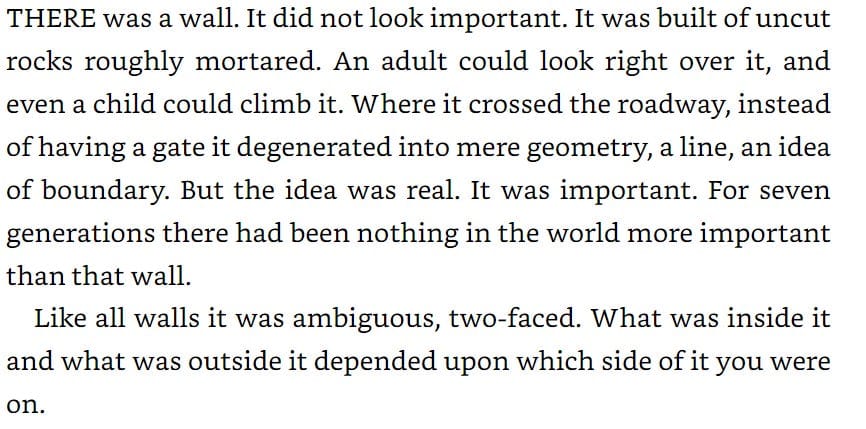
From Louis McMaster Bujold’s The Warrior’s Apprentice, which hits all my space opera buttons.
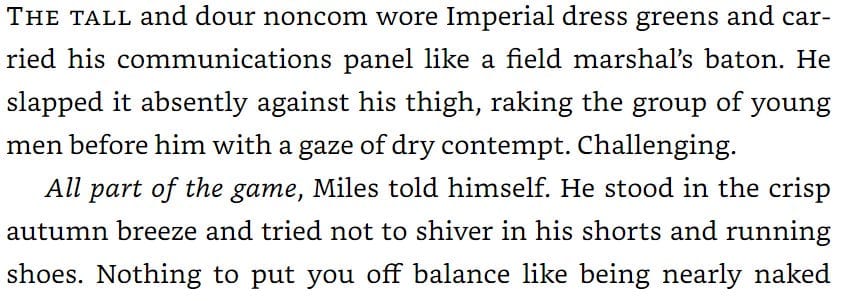
From Frank Herbert’s Dune, which is arguably similar to Memory in terms of scope.
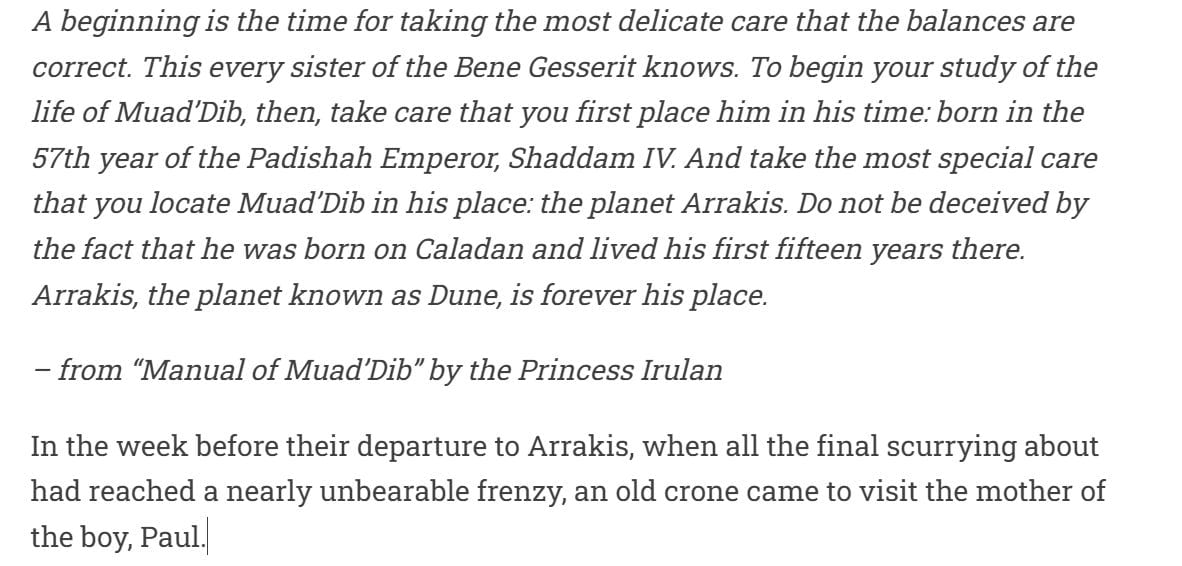
Now, let’s take a stab at the two openings of A Memory Called Empire. The prelude, and the actual first chapter.
The prelude:
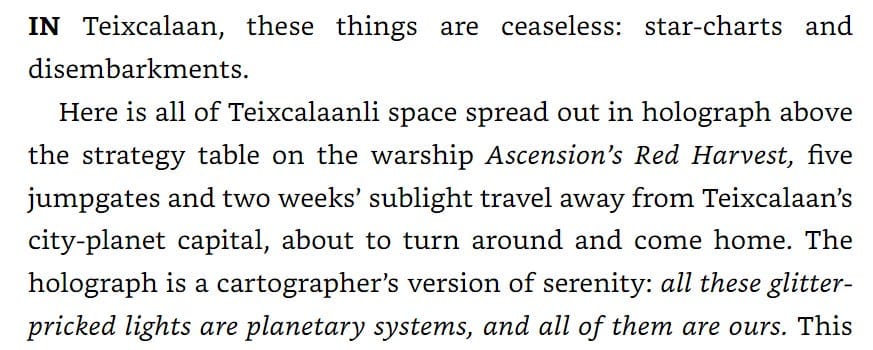
Chapter one:
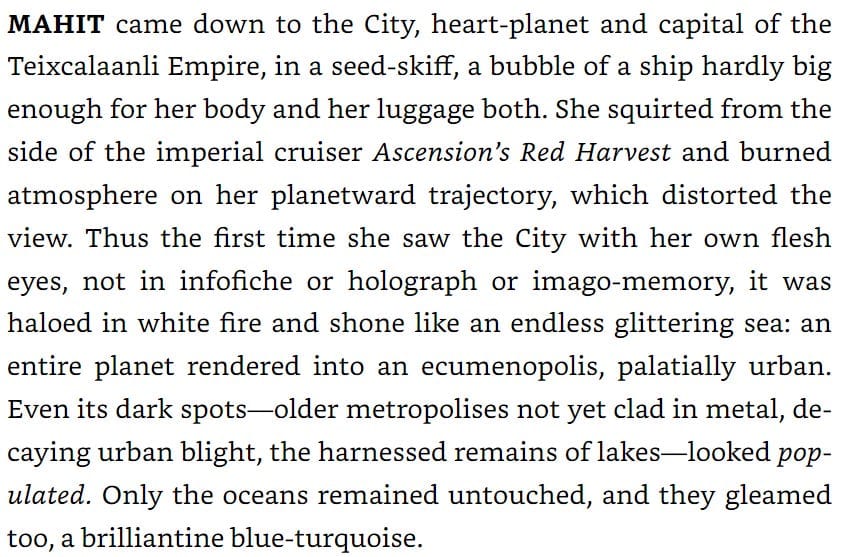
Actually, because there are extensive quotes at the beginning of each chapter, which themselves serve as story-building and world-building material, this selection is a bit artificial. But, I wanted to focus in on the meat.
In Tolkien and Bujold, we’re hit with a lot of character up-front. In Le Guin, we get pure setting—which prefigures the actual point of the novel: the reality (or lack thereof) of political systems, boundaries, and hierarchies. The ability for reality to be collectively agreed upon. In Herbert’s work, we get setting and character slammed into us in short order: as well as tone and perspective. We know it’s a history.
Something similar happens in Memory, actually. We know, right away, that it’s a grand-scale story. A historical story, playing out as part of a larger fabric. We know that the politics of colonization will play a major role. But the real character work doesn’t come until the first true chapter, and then only after large quotation chunks. And then, when we do get the character, we don’t get much actual information about her.
A strong character entrance isn’t the only thing that makes a novel, but I’ve come to feel, in my own writing, that it’s the most important thing to me. Within a page in The Dispossessed, we do get access to the central character, and a strong forward plot driven by that character. Even it, so focused on its allegorical opening, centers the person we’re to care about. The same with Dune—we’re given the shape of human beings before anything else.
I won’t leave spoilers here, don’t worry. But I will say that, throughout Memory, despite the great language, important themes of empire and culture, and interesting world-building, I never once felt attached to the characters. For one thing, the action of the story takes place in an extremely short span of time (a matter of days), which leaves the emotional bonds formed between the characters feeling very oddly intense. Why do the characters care so much for one another? Why are they willing to do things—sometimes things that go against their entire culture, their function in society, and their personal interest—in order to help one another?
It’s an odd problem, one I could have believed solved by simply extending the interior sense of time. It’s an echo of my biggest complaint with Patrick Rothfuss’s books: Kvothe doesn’t just do everything too well, he does everything too well, too quickly.
In my Master’s thesis, I focused on the concept of geography in storytelling. Its function, importance, value to a tale. One aspect of this is the sense of time that a story presents us with if geography is a constant factor. Science fiction often struggles with this because the vastness of space makes time delineation via travel within a story difficult.
When I finished Memory and went searching for other people’s thoughts on it, I ran into very few critical explorations of it, and a lot of fan posts. There is absolutely a lot of merit to the book, but it surprised me how difficult it was to find anyone with similar issues to me—at least, anyone who was willing to express them in a long-form, semi-coherent way. And, a lot of the critiques I did find I didn’t agree with, as always seems to be the case for me in such matters.
Part of this, I think, is that I want to actively inspect my reactions to a work of art like Memory. I want to do this in order that I might improve not only my own artistic efforts, but also my ability to experience and understand the world. So, my reason for seeking critiques is a bit different from most people.
Another difficulty was that I listened to the audiobook, which had a relatively strong narrator taking care of the most complex aspect of the book: the made-up languages and naming conventions. She read them off flawlessly, and rendered emphasis into speech in a way that worked well for me, for the most part.
I don’t have an absolute conclusion for this line of musing. All critique is subjective, after all. But, I do think I have a better idea of what works me, as a writer and reader, after reading Memory. I know that I love language and world building, but unless those aspects are intimately tied to character, I have a hard time caring enough to keep reading. I also know, definitively, that my immersion in a story is dependent upon a sense of relative space and time. Without a sense of time’s passage to render aspects of the plot believable, I get divorced from the tale that the author wants to tell.
I can’t say that I’m especially wary of meta-purpose in a story, otherwise I’d hardly enjoy Le Guin’s work at all. But I do think that the social concepts inherent in Memory get more “air time” than the lives of the characters. This last line of questioning is something I’ll have to delve into more in the future, but I think it’s important. What I want to say with my stories shouldn’t overpower the storytelling experience itself.
What are your thoughts?
From the World Wide Web
I wish I were starting off with some better world news, but sometimes that’s just not possible. In Oregon, a new law is being considered that would make non-violent direct environmental activism a matter of “domestic terrorism.”
If we’ve learned anything over the last few hundred years, it’s that the only form of protest that’s really worth a damn is the kind that involves at least some degree of direct participation. Blocking roads may be inconvenient for people trying to get to work, but it forces an otherwise sedate populace to pay attention. And with the climate degenerating at a deadly pace, we need direct action.
In recent cases, where tribal lands have been threatened by still further encroachment by the U.S. government, the only thing that slowed down the oil pipelines was direct intervention. The sort of direct intervention that this new law is aimed at classifying as terrorism.
We’ve seen the terrible consequences of things like the Patriot Act, which so deeply undermined our country’s concept of free democracy as to nearly render it into a complete veneer—in one stroke. We can’t let that happen again, here.
What’s more dangerous is that this bill comes from Democratic state Representative Paul Evans. It’s targeted at far-right terrorists, not water-defenders. But, it doesn’t matter why such laws are enacted. What matters is that, once enacted, they create a precedence for further such breaches of the trust between a people and its government.
And now for something completely different… because you probably need a laugh.
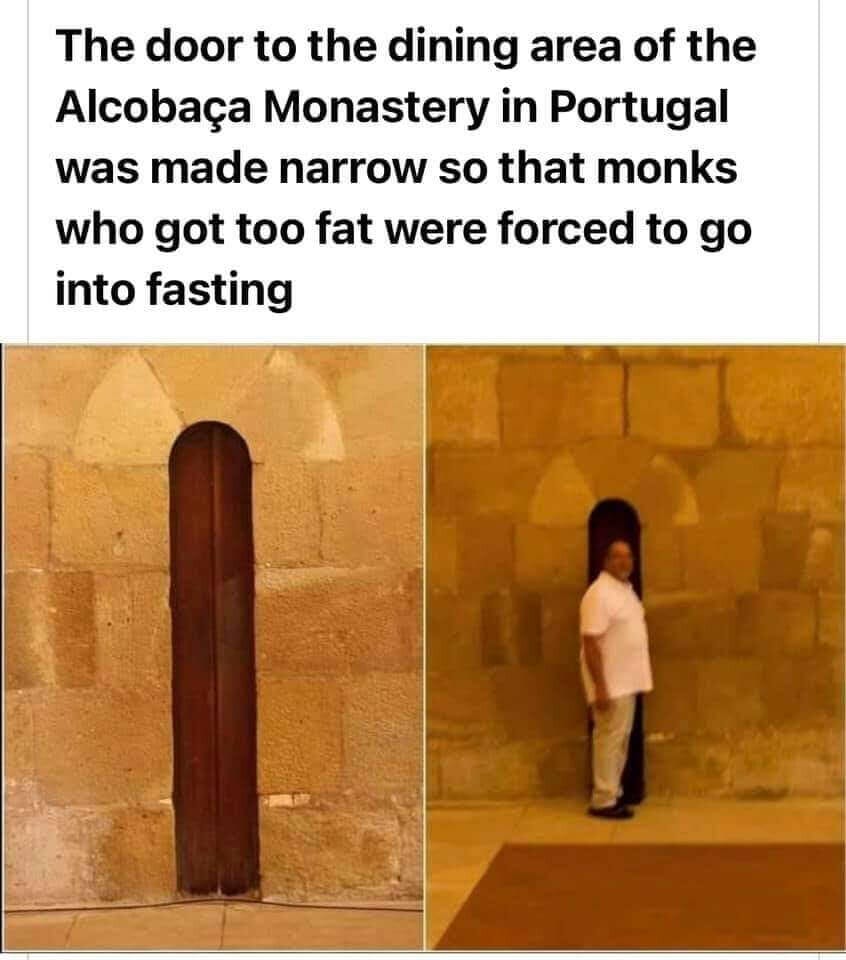
Alright, this turned into a pretty meaty newsletter! I’ll leave things off here and wish you the very best of weeks ahead.
Go easy, and if you can’t go easy, go as easy as you can.
~Odin Halvorson

